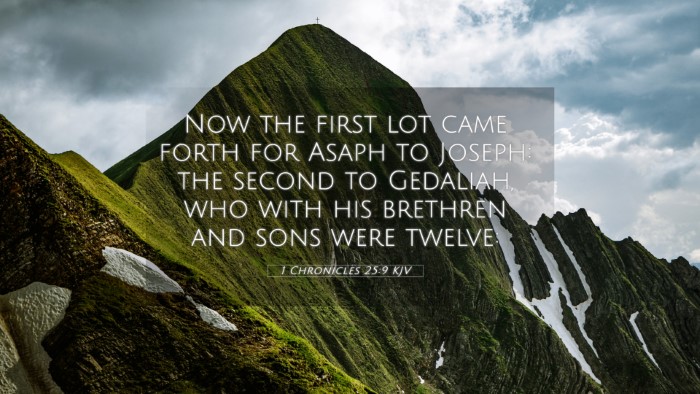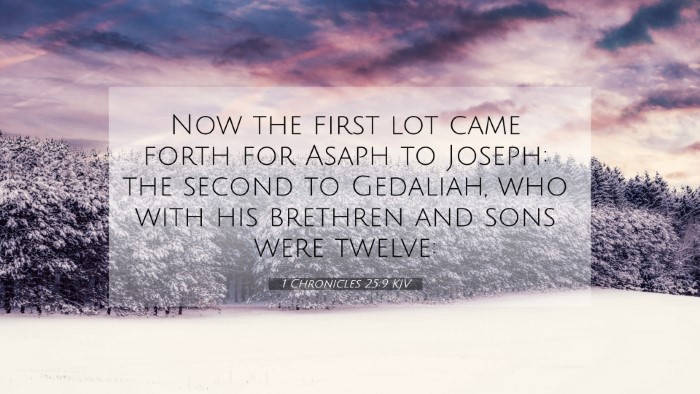Understanding 1 Chronicles 25:9
1 Chronicles 25:9 reads:
"And the sons of Asaph were Zaccur, and Joseph, and Nethaniah, and Asharelah, the sons of Asaph, under the hands of Asaph, which prophesied according to the order of the king."
This verse highlights the roles of Asaph's sons in the temple music ministry during King David's reign. It underscores the importance of worship and prophetic ministry in the life of Israel. The verse serves as an introduction to the musical order established by David for temple worship, linking both spiritual leadership and communal praise.
Commentary Insights
Drawing from various public domain commentaries, we can gain a deeper understanding of this verse:
-
Matthew Henry:
Henry emphasizes the significance of music in worship and the prophetic role it served. He mentions that Asaph was appointed to lead in praise, suggesting that music was not merely entertainment but a vital part of spiritual engagement and communication with God.
-
Albert Barnes:
Barnes expands on the role of Asaph's sons, noting that they were involved in conveying God's messages through prophecy. He highlights how their lineage symbolized a continuity in worship practices, illustrating the importance of maintaining proper worship according to divine order.
-
Adam Clarke:
Clarke notes that the names listed serve to recognize the individuals involved in the worship, reinforcing the idea of community participation in spiritual activities. He discusses the relevancy of these roles in contrasting personal experiences of worship with collective traditions.
Thematic Bible Verse Connections
1 Chronicles 25:9 can be cross-referenced with several other verses that further highlight similar themes of worship, prophecy, and the significance of music in relation to God’s people:
- Psalm 78:70-72: This passage reflects on God choosing David to lead Israel, emphasizing spiritual leadership alongside worship elements.
- 2 Chronicles 5:12-14: The dedication of the temple includes the musicians, illustrating how integral music was to worship.
- 1 Samuel 16:23: This shows how music played a comforting role in King Saul's experience, linking music to spiritual and emotional healing.
- Ephesians 5:19: In the New Testament, the call to sing psalms reflects the continuity of musical worship practices established in the Old Testament.
- 1 Peter 2:9: This verse speaks of being a royal priesthood, reiterating the importance of worship in the lives of believers, similar to the Levitical roles of Asaph’s descendants.
- Hebrews 13:15: This urges believers to offer a sacrifice of praise, further affirming that worship is a continual integral act in the life of faith.
- Acts 2:46-47: This describes the early church's communal worship, reflecting the historical continuity of praise and prophetic engagement seen in Asaph's lineage.
Making Connections with Other Bible Verses
The study of 1 Chronicles 25:9 can lead to a broader understanding of the interconnections within the Bible. Here are some key aspects to consider:
- Cross-Referencing Biblical Texts: By linking texts from different books, one can appreciate how themes of worship are consistently repeated and developed throughout the Scriptures.
- Bible Concordance Tools: Utilizing concordances can help identify terms like 'praise', 'worship', and 'prophecy', enabling one to trace these themes more effectively.
- Thematic Studies: Exploring passages related to music in worship can enlighten one's understanding of its spiritual significance.
Conclusion
1 Chronicles 25:9 serves as a bridge connecting the Old Testament's focus on organized worship and the continuity of these practices into the New Testament. The verse reminds us of the integral role that music, praise, and prophetic ministry played in the relationship between God and His people. By engaging in cross-referencing and comparative studies of these themes throughout the Bible, believers can deepen their appreciation of worship's historical and spiritual dimensions.


